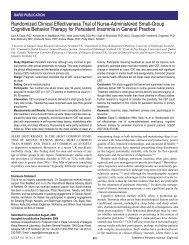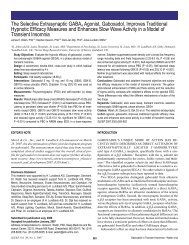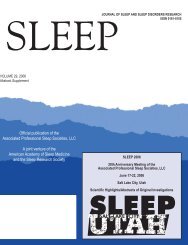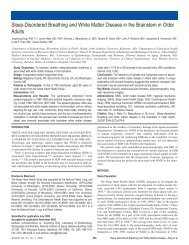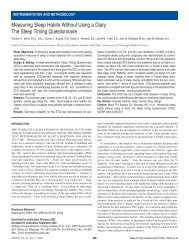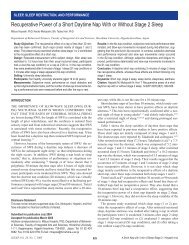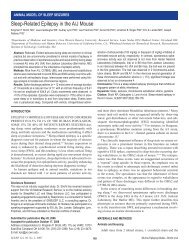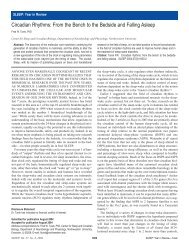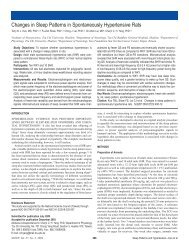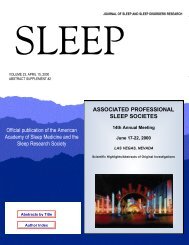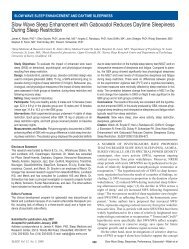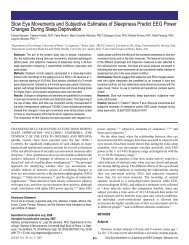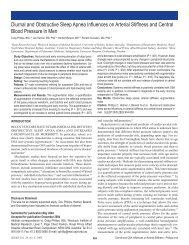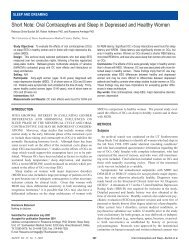SLEEP 2011 Abstract Supplement
SLEEP 2011 Abstract Supplement
SLEEP 2011 Abstract Supplement
Create successful ePaper yourself
Turn your PDF publications into a flip-book with our unique Google optimized e-Paper software.
B. Clinical Sleep Science III. Sleep Disorders – Insomnia<br />
0519<br />
TWELVE MONTHS OF NIGHTLY ZOLPIDEM DOES<br />
NOT PRODUCE WITHDRAWAL SYMPTOMS ON DRUG<br />
DISCONTINUATION: A PROSPECTIVE PLACEBO<br />
CONTROLLED STUDY<br />
Roehrs T 1,2 , Randall S 1 , Harris E 1 , Maan R 1 , Roth T 1,2<br />
1<br />
Sleep Disorders & Research Center, Henry Ford Health System,<br />
Detroit, MI, USA, 2 Psychiatry & Behavioral Neuroscience, Wayne<br />
State University School of Medicine, Detroit, MI, USA<br />
Introduction: Animal studies have demonstrated physical dependence<br />
with benzodiazepine receptor agonists (BzRAs). In patients chronic use<br />
of therapeutic doses of BzRA anxiolytics is associated with withdrawal,<br />
but reports of withdrawal with BZRA hypnotics are less conclusive. This<br />
study prospectively tested for withdrawal symptoms after 12 months of<br />
nightly use of the BzRA hypnotic, zolpidem 10mg.<br />
Methods: 29 DSM-IVR defined primary insomniacs, ages 32-64 yrs,<br />
with a sleep efficiency (sleep time/bed time) of 20 is considered clinically significant).<br />
The number of severe symptom ratings (2) given for any one of the<br />
20 symptoms was 3/15 in the placebo group and 1/14 in the zolpidem<br />
group. Placebo and zolpidem groups did not differ in their ratings on any<br />
of the 20 symptoms individually.<br />
Conclusion: In insomniacs, zolpidem 10 mg was not associated with<br />
withdrawal after chronic nightly administration, suggesting with hypnotics,<br />
a condition in which receptors are unoccupied for 16 hours a<br />
day, there is no withdrawal. This contrasts with BzRA anxiolytics, where<br />
receptors are occupied all day, and withdrawal is reported.<br />
Support (If Any): NIDA, grant#: R01DA17355 awarded to Dr. Roehrs.<br />
0520<br />
THE EFFICACY OF COGNITIVE BEHAVIORAL THERAPY<br />
FOR INSOMNIA ON FATIGUE SYMPTOM<br />
Yang C 1,2 , Lin Y 1 , Yang T 3<br />
1<br />
Department of Psychology, National Chengchi University, Taipei,<br />
Taiwan, 2 The Research Center for Mind, Brain, and Learning, National<br />
Chengchi University, Taipei, Taiwan, 3 School of Medicine, Fu-Jen<br />
University, Taipei, Taiwan<br />
Introduction: Fatigue is one of the most common daytime complaints<br />
in patients with insomnia. Cognitive behavioral therapy for insomnia<br />
(CBT-I) has been proved to decrease fatigue in patients with insomnia<br />
comorbid with cancer. However, it is still not clear if CBT-I is effective<br />
in decreasing fatigue among patients with primary insomnia. The<br />
goals of this study are to: 1) investigate the effect of CBT-I on fatigue<br />
complaint, and 2) explore the association between the improvement in<br />
fatigue and changes in sleep-related psychological factors, including<br />
sleep beliefs, sleep habits, and arousal symptoms in patient with primary<br />
insomnia.<br />
Methods: 67 patients with primary insomnia were recruited for the<br />
study. Before and after a 6-week CBT-I program, they completed a<br />
package of questionnaires including situational fatigue scale (SFS), dysfunctional<br />
beliefs and attitudes about sleep scale (DBAS), sleep hygiene<br />
practice scale (SHPS), pre-sleep arousal scale (PSAS), insomnia severity<br />
index (ISI).<br />
Results: Prior to the CBT-I, physical fatigue (PF) and mental fatigue<br />
(MF) correlated significantly with ISI. PF decreased significantly following<br />
CBT-I (F=7.33, p < .01), while MF did not (F=1.13, n.s.). The<br />
decrease of PF correlated significantly with the decrease of score on<br />
Cognitive Arousal subscale of PSAS (r=0.24, p



